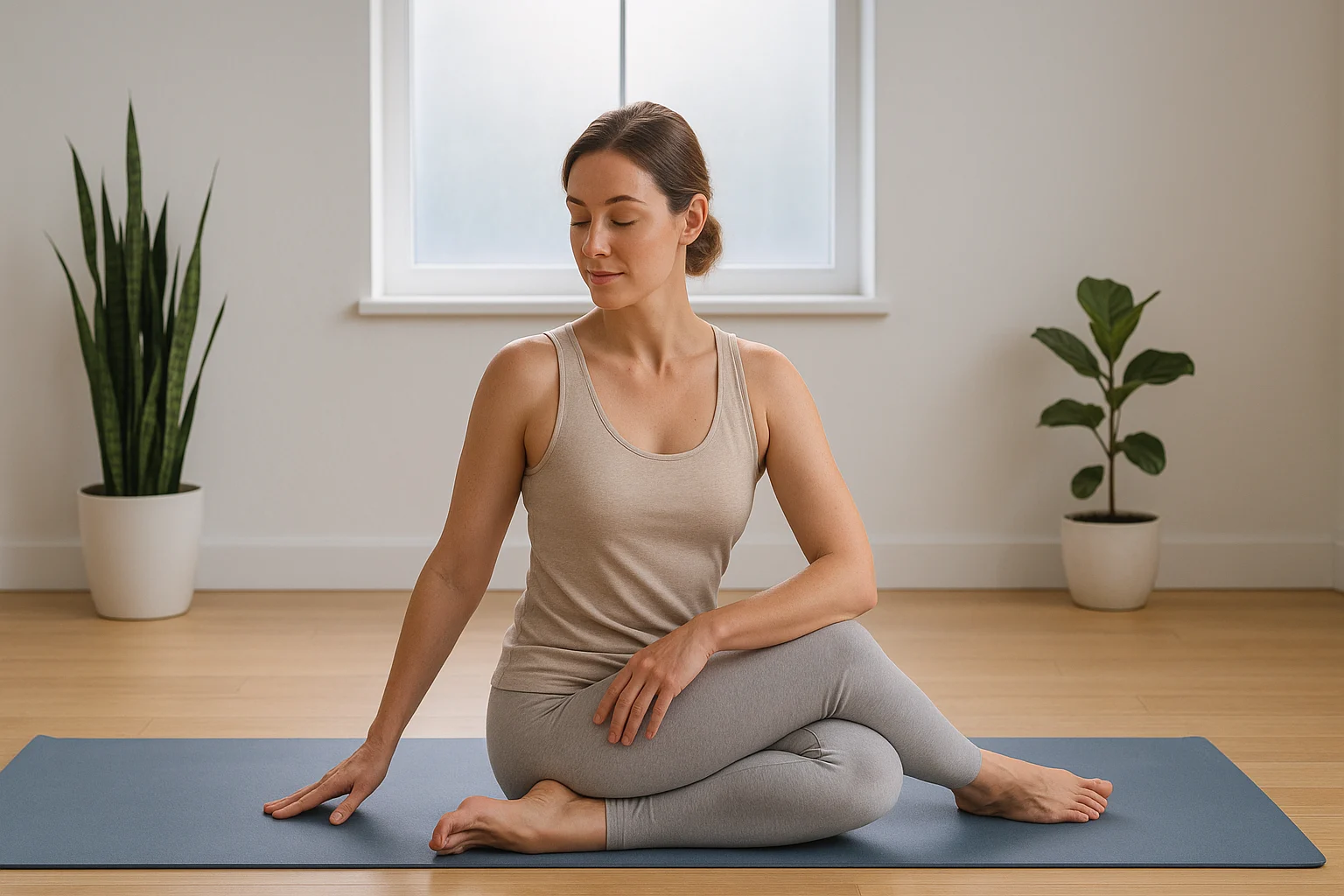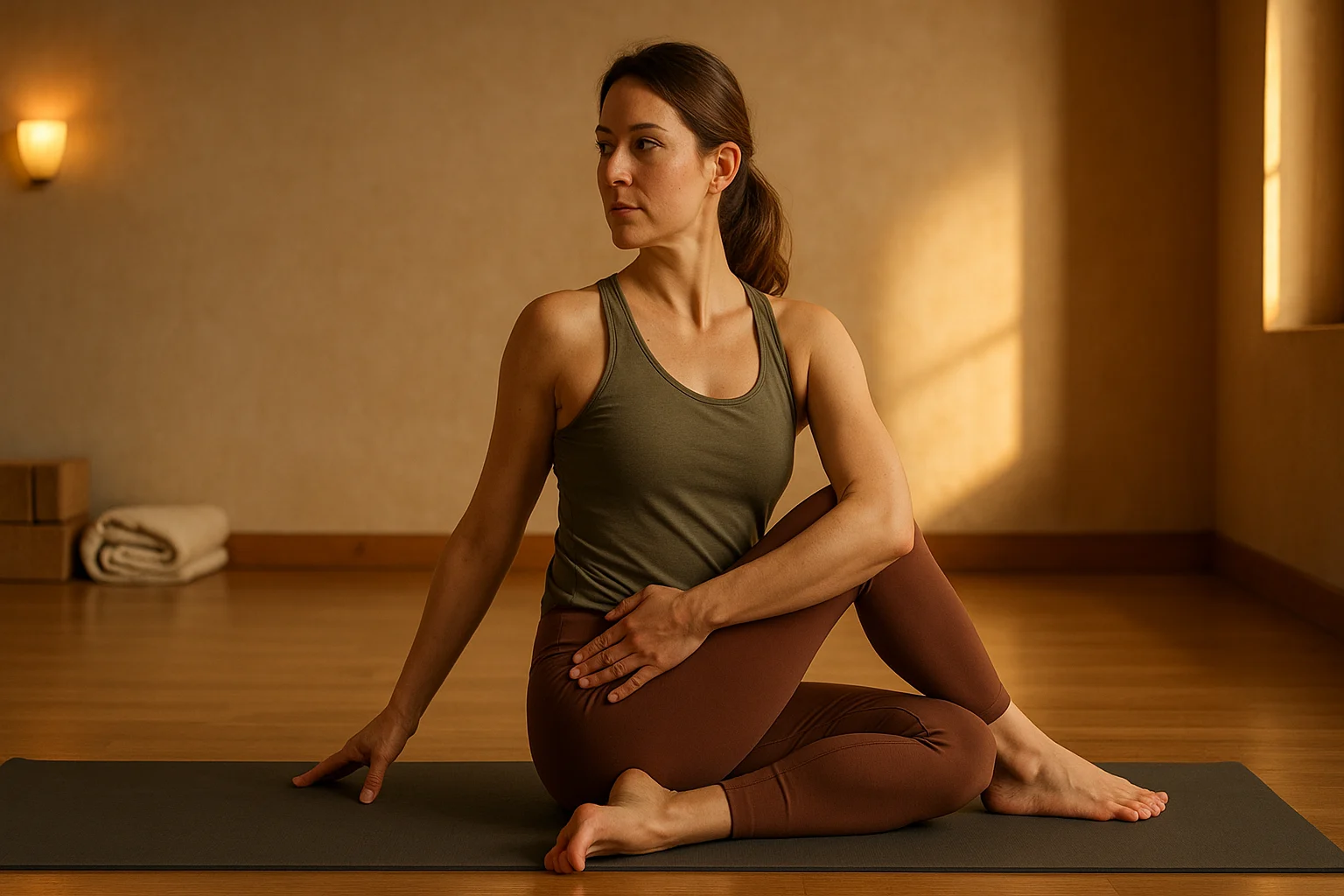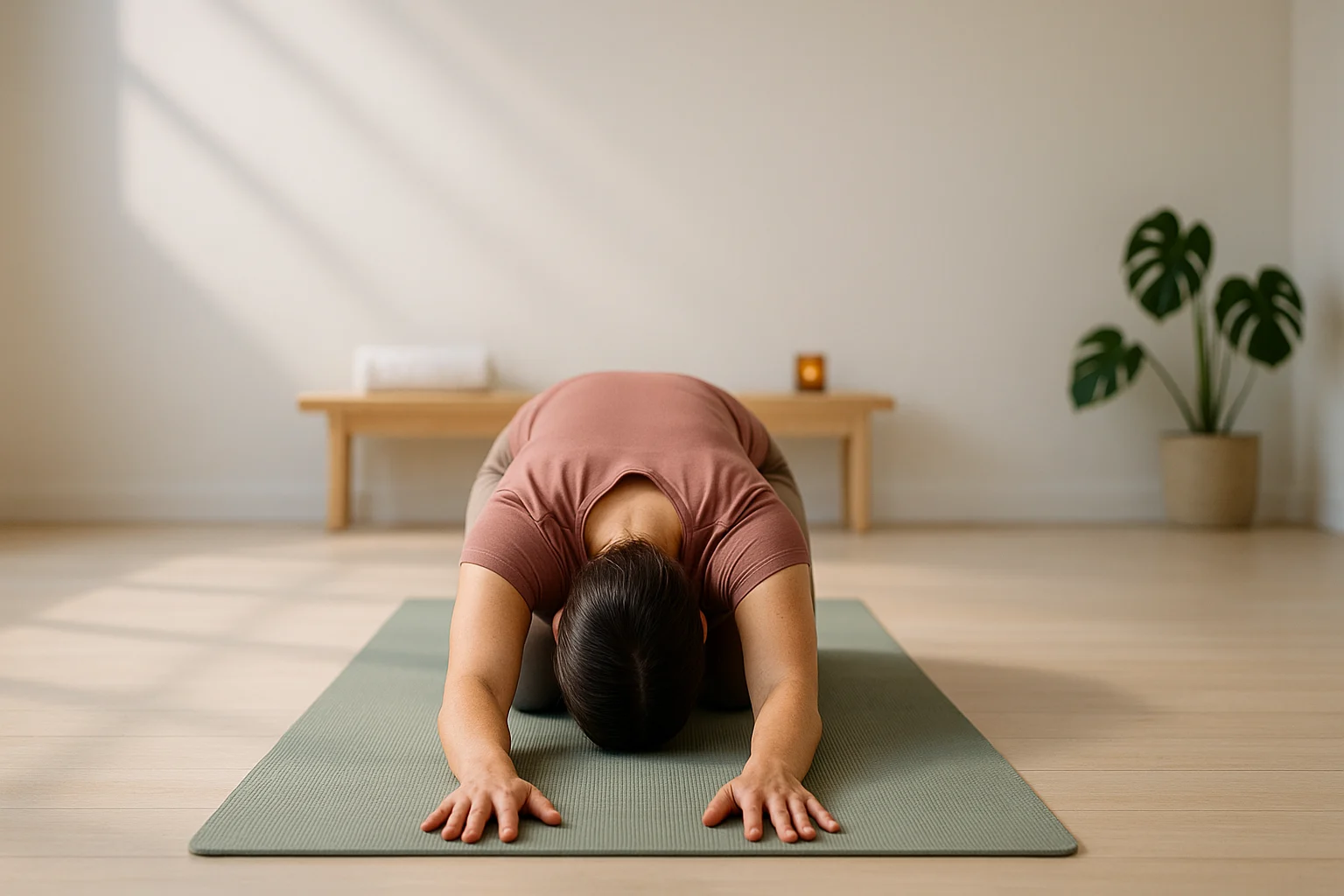
Struggling with bloating or sluggish digestion? You’re not alone. If you’ve been searching for yoga poses digestion, you’re in the right place. Gentle stretches, twists, and mindful breathing can help ease gas, support regularity, and support gut comfort—in as little as 10 minutes a day. For a deeper dive, see our pillar guide on yoga specialized health. Ready to twist, stretch, and breathe your way to a happier gut? Let’s dive in.
Find Your Perfect PoseTable of Contents
Key Benefits of Yoga for Digestion
Curious about digestion yoga benefits? Here’s a quick snapshot:
- Stimulates Organs: These poses lightly massage the stomach, intestines, and liver to help move food and waste along.
- Reduces Stress: Deep breathing calms the nervous system and may ease stress-related gut discomfort. Try yoga for stress relief to enhance this benefit.
- Boosts Circulation: Poses increase blood flow to digestive organs, delivering oxygen and nutrients.
- Releases Gas: Twists and compressions help move trapped gas, reducing bloating.
- Promotes Consistency: A regular 10-minute practice may support long-term gut comfort and regularity.
This post has affiliate links. We may earn a commission. Learn more.
Yoga Poses Digestion: Why They Help
Your gut breaks down food, absorbs nutrients, and moves waste along with wave-like muscle contractions (peristalsis). Stress, a so-so diet, or too much sitting can slow that down and leave you bloated or backed up. Here’s how yoga can help:
- Massages Organs: Twists and gentle compression nudge your digestive tract to wake up and move.
- Calms the Nervous System: Your gut, often called the “second brain,” thrives when relaxed. Yoga’s breathing activates the “rest and digest” system, complemented by breathwork for anxiety.
- Improves Blood Flow: Poses enhance circulation, supporting organ function.
- Eases Gas: Specific movements create space to release trapped gas.
Yoga aligns body and breath—great news for a calm, steady gut.

The Science Behind Digestive Yoga
How does this actually work? It’s part body mechanics, part nervous-system reset—and it explains many digestion yoga benefits:
- Compression Effect: A twist lightly squeezes the belly; when you release, fresh blood rushes back in and things tend to move better.
- Peristalsis Boost: Gentle pressure can encourage the wave-like contractions that move food along—useful when you’re constipated.
- Stress & Gut–Brain Axis: Breath-led yoga may help downshift the stress response, which some people find eases IBS-related symptoms. The NCCIH (NIH) overview on IBS reports a small amount of evidence that yoga may help symptoms, though findings are mixed and evidence quality is low.
- Lymphatic Support: Some poses may support lymphatic flow and natural fluid movement, which can indirectly support digestion.
- Core Strength: A strong core improves posture, giving organs space.
Best Yoga Poses to Aid Digestion
Ready to try some digestive yoga? If you’re searching for yoga poses digestion, below are 10 beginner-friendly moves for your gut. Go at your pace and keep the breath slow and steady.
1. Digestive Yoga Poses: Wind-Relieving Pose (Pawanmuktasana) 💨
Feeling gassy? This pose earns its name and often takes the edge off bloating.
- Helps release trapped gas and ease pressure.
- Encourages gentle intestinal movement.
How to Do It:
- Lie on your back and stretch your legs long.
- As you exhale, draw both knees in toward your chest.
- Interlace your fingers over your shins (or just below the knees).
- Hug the knees closer; if it feels good, lift your head slightly toward them.
- Breathe slowly for 30–60 seconds, then ease out.
2. Cat-Cow Stretch (Marjaryasana-Bitilasana) 🐱
This flowing stretch warms up your spine and gut.
- Massages abdominal organs.
- Boosts spinal flexibility and circulation.
How to Do It:
- Come to hands and knees with wrists under shoulders and knees under hips.
- Inhale for Cow: soften the belly, lift the chest and tailbone, gaze forward.
- Exhale for Cat: round the spine, tuck the chin, draw the navel in.
- Move through 10–20 rounds, matching breath to motion.
3. Seated Spinal Twist (Ardha Matsyendrasana) 🌀
Twists are commonly used for digestion and may help you feel less tight through your midsection.
- May stimulate the intestines and liver.
- Supports circulation; some people feel relief after gentle twists.
How to Do It:
- Sit tall with both legs extended.
- Bend the right knee and plant the right foot outside the left thigh.
- Keep the left leg long or bend it so the heel nestles near the right hip.
- On an inhale, grow tall; on an exhale, rotate to the right.
- Right hand supports behind you; left elbow hooks outside the right knee.
- Gaze over the right shoulder and hold 30–60 seconds.
- Unwind slowly and switch sides.
4. Supine Spinal Twist (Supta Matsyendrasana) 🔄
Perfect for relaxing and easing gas before bed.
- May relieve bloating and ease tension.
- Calms the nervous system.
How to Do It:
- Lie on your back, knees bent, feet grounded.
- Open the arms into a “T,” palms up or down.
- Slide the hips an inch to the right.
- Let both knees drift left, keeping both shoulders heavy on the mat.
- Option to turn the head right; linger 1–2 minutes.
- Return to center and repeat to the other side.
5. Child’s Pose (Balasana) 👶
This calming fold is like a hug for your gut.
- Can ease gas and general belly discomfort.
- Helps your system downshift into “rest and digest.”
How to Do It:
- Kneel with the big toes touching.
- Knees can go wide for space or stay together for a snugger fold.
- Bow forward and let your torso rest on or between your thighs.
- Stretch the arms forward or drape them by your sides, palms up.
- Set your forehead on the mat and breathe 1–5 minutes.
6. Cobra Pose (Bhujangasana) 🐍
A gentle backbend that opens the front of your body.
- Stretches the belly and chest.
- May ease mild constipation.
How to Do It:
- Lie prone with legs long behind you.
- Set the hands beneath the shoulders, fingers pointing forward.
- On an inhale, peel the head and chest up while the pubic bone and navel stay heavy.
- Keep a gentle bend in the elbows; hold 15–30 seconds.
- Exhale and release down.
7. Bow Pose (Dhanurasana) 🏹
A deeper backbend that gives the belly a steady massage.
- Stimulates the digestive organs.
- May ease gas and build midline strength.
How to Do It:
- Lie on your belly, bend both knees, and take hold of your ankles.
- With an inhale, lift the chest and thighs as the heels press back.
- Keep breathing for 15–30 seconds, then lower with control.
8. Forward Folds (Paschimottanasana & Janu Sirsasana) 🙏
These folds compress the belly briefly, which can help things move along.
- Lightly massages the organs and can promote bowel movement.
- Helps settle stress that can show up in the gut.
Seated Forward Fold (Paschimottanasana):
- Sit with your legs extended and feet flexed.
- Inhale to lengthen the spine.
- Exhale to hinge at the hips and ease the torso over the legs.
- Rest hands on shins or feet; stay 1–3 minutes.
Head-to-Knee Forward Fold (Janu Sirsasana):
- Sit with the left leg long and the right sole tucked to the left inner thigh.
- Breathe in to elongate the spine.
- Breathe out to fold over the left leg; hold, then switch sides.
9. Reclined Bound Angle Pose (Supta Baddha Konasana) 🦋
Helps soften belly tension and downshift your nervous system.
- Helps soften belly tension.
- Helps switch on your “rest and digest” mode.
How to Do It:
- Lie on your back, bring soles of the feet together, and let knees open.
- Support the thighs with cushions if that feels better.
- Hands rest on your belly or by your sides. Stay 3–10 minutes.
10. Savasana (Corpse Pose) 😴
Full-body rest so your system can settle.
- Helps lower stress, which often calms the gut.
- Integrates benefits of your practice.
How to Do It:
- Lie flat with legs wider than hips, feet relaxed.
- Place arms by your sides, palms up.
- Close your eyes, breathe deeply, and stay for 5–10 minutes.
How to Maximize Your Yoga for Gut Health
Want to get more from your yoga when you’re feeling bloated? Here are my go-to tips from years of practice:
- Breathe Deeply 🌬️: Belly breathing massages organs and calms your system. I love alternate nostril breathing for balance.
- Time It Right ⏰: Morning flows wake my gut; before meals can help prime digestion; 2–3 hours after eating may feel gentler if you’re bloated.
- Stay Hydrated 💧: I sip water before and after practice to keep things moving smoothly.
- Listen to Your Body 🧘♀️: If a pose feels off, I ease up. Yoga should feel good!
- Eat Smart: Fiber-rich oats or fruit help, and basic Ayurvedic tips can too. I skip heavy meals before practice.
- Be Consistent: Ten minutes a day adds up fast.
Slow, steady breathing is where the gut-friendly benefits of yoga start.
Sample 10-Minute Digestive Yoga Flow
Here’s a short flow I use when my gut needs a little support:
| Pose | Duration | Benefit |
|---|---|---|
| Belly Breathing | 5 min | Calms nervous system, preps gut |
| Cat-Cow Stretch | 2 min | Warms spine, stimulates organs |
| Wind-Relieving Pose (each side) | 1 min | Releases gas, eases bloating |
| Seated Spinal Twist (each side) | 1 min | Supports circulation; may stimulate the intestines |
| Cobra Pose (3x) | 15 sec each | Stretches the front body; may encourage gentle movement |
| Seated Forward Fold | 2 min | Compresses organs, aids elimination |
| Supine Spinal Twist (each side) | 2 min | Relaxes, relieves tension |
| Reclined Bound Angle | 3 min | Calms the nervous system |
| Savasana | 5 min | Reduces stress and integrates the practice |
Real Stories: Yoga Transforms Gut Health
People often notice changes in how they feel. These are personal experiences—results vary.
- Sarah’s Relief: “Stress left me bloated and constipated. After a few weeks of evening yoga for gut health, my bloating eased and I’m more regular. Twists are my lifesaver.”
- Mark’s IBS Journey: “With IBS, gas pain was constant. Cat-Cow and Child’s Pose, paired with deep breathing, calm my gut. It’s not a cure, but it feels noticeably helpful for me.”
- Emma’s Morning Boost: “I started a 10-minute morning flow with Wind-Relieving Pose. My constipation improved, and I feel lighter most days!”

Find Your Perfect Digestive Yoga Pose
Not sure where to start? Click below to find the best pose for you!
Discover Your Ideal Pose
Question 1 of 3
What’s your main digestive goal?
Frequently Asked Questions
Your Path to a Happier Gut
Embracing yoga poses for digestion is a step toward feeling better. Listen to your body, pair the practice with a balanced diet, and keep it consistent. Start small, stay consistent, and enjoy a calmer gut.


